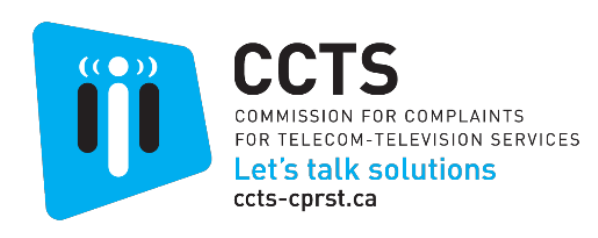
Rogers and Fido see largest increases
OTTAWA – The Commission for Complaints for Telecom-television Services (CCTS) accepted 17,003 consumer complaints in the past year – a 9% increase compared to the previous year, according to its annual report released today.
The annual report covers the period from Aug. 1, 2020, to July 31, 2021. In this timeframe, CCTS concluded 17,506 complaints, a 10% increase from last year (this includes complaints received before Aug. 1, 2020, which were concluded during the year covered by today’s report.)
The concluded complaints raised over 42,000 issues. The top issues were billing (16,304), contract dispute (13,147), service delivery (11,130) and credit management (1,673). Wireless had the most issues raised (18,466), followed by Internet (13,202), TV (5,153) and local phone (5,012).
There were 96 confirmed breaches of the Wireless Code this year, which represents a decrease of 48% from last year, “driven by a significant decline in confirmed breaches for Koodo (101 last year compared to 4 this year),” the report says.
The section of the Wireless Code on contracts and related documents “remains the most-breached section of the Wireless Code, accounting for 36.4% of all confirmed breaches – although there was a 57% decrease in confirmed breaches of this section compared to last year,” according to the report.
This was the CCTS’s first full year of reporting on the Internet Code, which came into effect on Jan. 31, 2020. “There were 18 confirmed breaches of the Internet Code this year. Last year, we reported two confirmed breaches for the six months the code was in effect,” the report says. Eight breaches were about disconnection, four were about clarity and another four were about contract cancellation and extension.
There were five confirmed breaches of the Television Service Provider Code this year, compared to seven last year and five confirmed breaches related to the Deposit and Disconnection Code this year, compared to nine last year.
Participating service providers with the most complaints overall are Bell (20.7% of all accepted complaints), Rogers (13.9%), Fido (9.9%), Telus (7.2%) and Virgin Plus (6.9%).
Of those service providers, Rogers and Fido had the highest increases in complaints this year compared to last – by 32.6% and 49.2% respectively.
“We are committed to delivering the best experience for our customers in every interaction we have,” a Rogers spokesperson said in an emailed statement to Cartt.ca. “These CCTS complaints represent less than 0.01% of our total customer interactions, and although we completed over 36 million conversations with Canadians during this twelve-month period, we recognize even one complaint is one too many and we are continuing to listen to our customers and use their feedback to help us improve.”
Shaw and Freedom Mobile, which Rogers is seeking approval to acquire, had 870 and 995 complaints respectively. This represents an increase in complaints for Shaw by 12.8% compared to last year and a decrease in complaints for Freedom Mobile by 6.7%. (Shaw did not return a request for comment from Cartt.ca by deadline.)
Of the five participating service providers that received the most complaints, Bell is the only one with fewer complaints (by 7.8%) this year compared to last.
“The 2020-21 CCTS annual report shows Bell’s continued focus and dedication on customer experience paying off with the continuation of our 6-year declining trend of total complaints,” said a Bell spokesperson in a statement emailed to Cartt.ca. “While complaints to the CCTS from across the industry increased by 9%, Bell saw a decline of 8% and overall, Bell’s share of complaints dropped 4% from the previous year.”
Telus issued a press release this morning about the CCTS report that also highlighted its dedication to customers. “For more than a decade, Telus has led the industry with the fewest complaints amongst national carriers as confirmed by this year’s [CCTS] report,” the release says.
“The significant investments we make in our culture of putting customers first and our superior network has earned us the most loyal customer base in the industry, though we will not be satisfied and will continue to embrace our customer’s feedback until we receive zero complaints,” said Zainul Mawji, Telus’s executive vice-president of home solutions, in the release.
In its own press release, the Public Interest Advocacy Centre (PIAC) said the report shows consumers have been “struggling with Internet services during the continuing Covid-19 pandemic.”
“Increased home internet usage by Canadians during Covid-19 restrictions highlights serious problems with Canada’s Internet industry and regulation,” said John Lawford, PIAC’s executive director and general counsel, in the press release.
Noting the CRTC’s Internet Code had 18 confirmed violations while over 13,000 Internet issues had been raised, Lawford said: “That’s a ridiculously low number that we think means the Internet Code has no real substantive consumer protections while consumers are led by regulators and industry to think that it protects them.”
This year’s annual CCTS report for the first time “captures a full year of Canadians living through the pandemic, which began midway through the CCTS’ last Annual Report period,” says a CCTS press release announcing the publication of the report.
“With the Covid-19 pandemic, Canadians relied increasingly on their communications services, especially for remote work and learning, keeping in touch with loved ones, ordering essential items and leisure activities,” said commissioner and CEO of the CCTS, Howard Maker, in the press release.
“We encourage providers to continue listening to consumers and actively work with their customers to fix problems as they arise. When they are unsuccessful, we are here to help consumers resolve disputes with their service provider.”
To read the full report, please click here.



